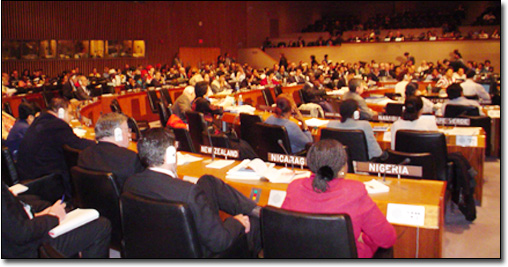|

COVERAGE
FROM THE UN PERMANENT FORUM ON INDIGENOUS ISSUES
MAY 12, 2003
UNITED NATIONS HEADQUARTERS
NEW YORK CITY
The second meeting of the United Nations Permanent Forum on
Indigenous Issues took place at UN Headquarters in New York on Monday and
brought together Indigenous leaders, representatives of member States and
UN agencies from all parts of the world. This new Forum represents an historic advance in Indigenous
Peoples' efforts to reach the ear of the international community and make
their needs and concerns known. While they have made steady progress at
the UN - from their first approach to the League of Nations to the Working
Group on Indigenous Populations and the subsequent establishment of an
International Decade for Indigenous Peoples - the creation of the Forum as
a subsidiary body of the Economic and Social Council is a breakthrough
achievement.
Secretariat of the UN Permanent Forum on Indigenous Issues
Second Session of the UN Permanent Forum

MEMBERS OF THE PERMANENT FORUM
The Permanent Forum is made up of 16 independent experts - eight nominated
by governments and eight appointed by the President of the Economic and
Social Council, following consultations with governments on the basis of
previous consultations with Indigenous organizations. The election
process, particularly of those nominated by Indigenous groups, required
broad regional consultations with Indigenous groups around the world. All
members serve for three years, with the possibility of re-election for one
additional year.
Never before have Indigenous Peoples served as "independent experts" on a
United Nations body, and the Permanent Forum members will report and make
recommendations directly to the Council. The independent experts will not
function as representatives of their peoples, but rather in their own
capacities. To date, only 15 of the 16 members of the Forum have been
designated.
Hundreds of Indigenous representatives, attending the first session of the
Permanent Forum in New York City at UN headquarters delivered more than
1000 statements to the experts, in response to UN agency presentations,
and in dialogue with experts, States, intergovernmental and
non-governmental organizations, and representatives of UN bodies and
organs.
The challenge for the Permanent Forum members is to organize all the
statements into a cohesive document to be presented to the Economic and
Social Council.

Meet the Experts
Eight Indigenous experts appointed by the President of the Economic and
Social Council
Mr. Antonio JACANAMIJOY (Colombia)
Mr. Ayitégan KOUEVI (Togo)
Mr. Willie LITTLECHILD (Canada)
Mr. Ole Henrik MAGGA (Norway)
Ms. Zinaida STROGALSCHIKOVA (Russian Federation)
Mr. Parshuram TAMANG (Nepal)
Ms. Mililani TRASK (USA)
Mr. Fortunato TURPO CHOQUEHUANCA (Peru)
Eight state-nominated experts:
Mr. Yuri A. BOITCHENKO (Russian Federation)
Ms. Njuma EKUNDANAYO (Democratic Republic of Congo)
Mr. Yuji IWASAWA (Japan)
Mr. Wayne LORD (Canada)
Ms. Otilia LUX de COTI (Guatemala)
Mr. Marcos MATIAS ALONSO (Mexico) NI
Ms. Ida NICOLAISEN (Denmark)
Mrs Qin XIAOMEI (China)
MANDATE OF THE PERMANENT FORUM
The mandate of the Forum is to advise and make recommendations to ECOSOC
on economic and social development, culture, human rights, the
environment, education and health. In addition to advising the Council,
the Forum has been asked to raise awareness, promote the integration and
coordination of activities relating to Indigenous Issues within the UN
system, and prepare and disseminate information on Indigenous Issues. It
will meet once each year for ten working days.
The Forum was established on 28 July 2000 by the Economic and Social
Council, on the recommendation of the Commission on Human Rights. The
distribution of governmental seats is based on the five United Nations
regional groups, with three additional seats rotating among the regions.
This term, the three regional groups of Latin America and the Caribbean,
Western Europe and Asia each have two seats. Indigenous Peoples have
nominated their candidates on the basis of 7 geo-political regions that
they have devised to more accurately reflect cultural regions, with one
rotating seat.
Adapted from UN Press Releases and Backgrounder
|


